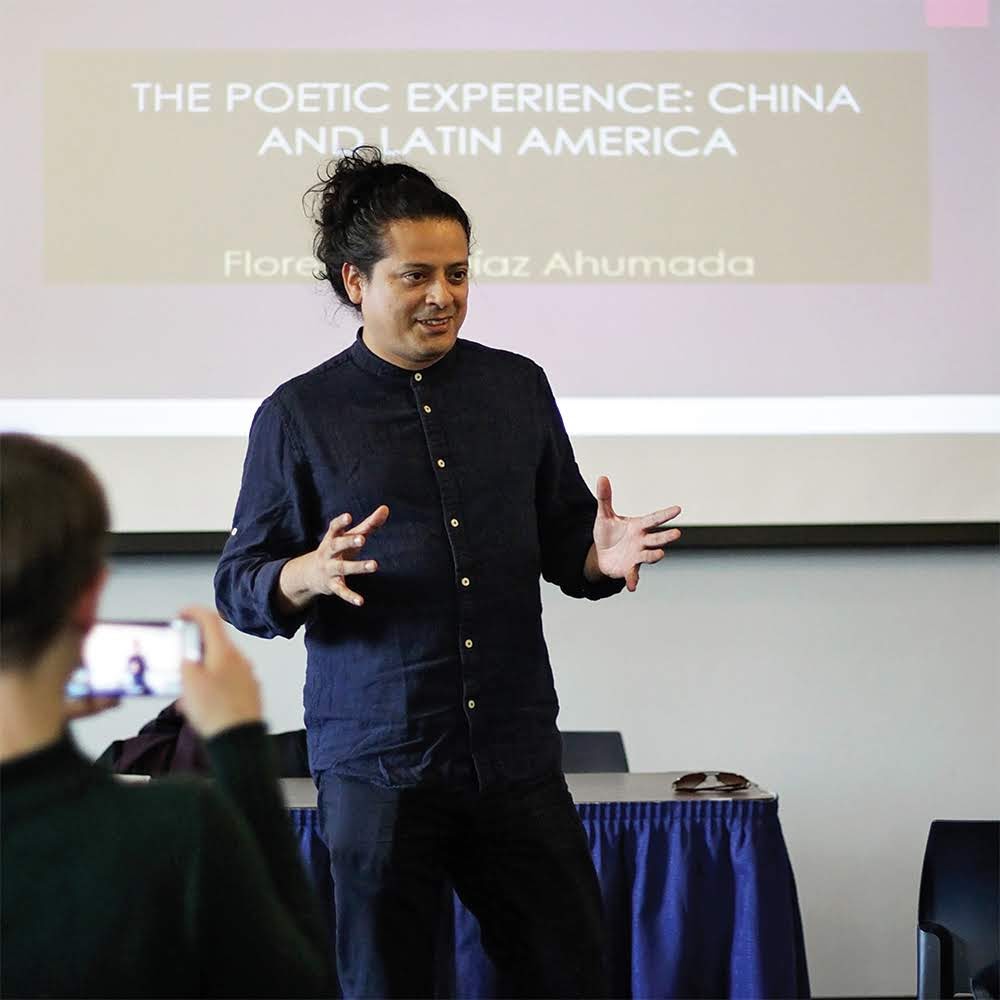On Friday, Feb. 28, students and faculty members gathered in the Bangor Room of the Memorial Union for a presentation entitled “China and Latin America: a Poetic Experience” given by Peruvian poet Florentino Diaz Ahumada.
The presentation was a unique auditory and emotional experience for those in attendance. Ahumada opened by explaining what drove him to consider taking part in a trip to China, and how his love of poetry influenced him throughout his early life. It was soon after the publication of his book, he recalls, that he began to get interested in traditional Chinese medicine.
Ahumada’s interest in Chinese culture began unexpectedly when he sought acupuncture treatment over a decade ago. The treatment eventually prompted him to study traditional Chinese medicine, completing the first part of his training in 2009.
“Like with any passion, we practice a sort of continual learning,” Ahumada explained, speaking about subjects we deeply care about. As he continued his studies, and the more he began to explore other areas of Chinese culture, the more he realized that it was, in some ways, very similar to the Andean way of life in which he was raised. He explained that the human role in creating poetry is as an intermediary one, shifting between the physical and emotional realms of being and interpreting the life force that the Chinese call Ch’i.
Ahumada also invited all those in attendance to participate in a relaxing breathing exercise. Playing soothing music, he asked the audience to remain present and experience the emotion inside themselves. He went on to explain in greater detail some of the ties the practice had to Chinese cultural beliefs, such as “meditation being elemental food for the soul” among other things.
Ahumada went on to explain the paradox poetry represents, particularly “in describing things that are [intangible] in relation to reality,” he said, calling “the fact … that we can be moved emotionally by such things” a contradiction in itself. He related the emotional transformation present in poetry to the concept of Ch’i and Chinese calligraphy, which similarly uses movement to map energy.
Sickness, he explained, is something he categorizes in a general sense, calling it “a disharmony between the Ch’i around you and the Ch’i within you,” and noting that to harness the Ch’i, or movement, it is necessary to dance with it rather than struggle against it.
Ahumada evidently took this knowledge to heart when he visited China, connecting with people from a variety of different countries, including fellow Latin Americans, with whom he conversed constantly on a wide range of issues. He noted that the removal from his home country allowed him to discuss contentious topics like politics with others from the region, with greater freedom than he might have been able to otherwise, and he contends that this removal allows for such interactions to occur because it’s such a great platform for adaptation.
During the lecture, Ahumada took time to touch on other abstract concepts, providing interesting angles from which to approach them. For example, in discussing the idea of emptiness, Ahumada explained that emptiness is of great importance in that it doesn’t have to represent nothingness; instead, it can represent all that can be done in the available space. He also suggested that sharing your opinions and experiences with a group enables the group as a whole to balance the Ch’i and better interact with one another.
Always animated and engaging, Ahumada’s energy and skills as a storyteller were on display as he closed out the presentation with a tale about the power of conquering one’s fears. With Ahumada exploring what it means to create poetry from intangibles, and how movement and Ch’i play a vital role in how this creative energy is managed, the presentation was an opportunity for the audience to engage in Ahumada’s fascinating viewpoints. Especially noteworthy was perhaps the meditative practice, which compelled attendees to examine their own thoughts and emotions from a fresh perspective.
The event, sponsored by the Rising Tide Center in partnership with the University of Maine Unido project, helmed by professors Dan Sandweiss and Carlos Villacorta, which aims to bring speakers from Latin and South America to the University, will be presenting another lecture later this week. On March 3, archaeologist Gabriel Prieto will give a free lecture on El Nino-related sacrifices on Peru’s northern coast in the Collins Center for the Arts.










